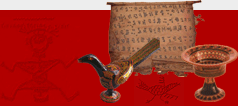| 您的位置:首页 --> 与会学者 --> 论文提要 |
彝族当代诗歌中的大自然
The Natural World in Contemporary Yi Poetry
Bender Mark 马克·本德尔
Department of East Asian Languages and Literatures, The Ohio
State University, USA
美国俄亥俄州立大学东亚语言文学系
【摘要】这篇论文将探讨几首彝族现代诗中关于自然界的意象和主题。从20世纪80年代开始,中国涌现出一批彝族诗人,他们活跃在中国诗坛,在世界上也有一定影响。这些彝族诗人包括吉狄马加、倮伍拉且、马德清、巴莫曲布嫫、阿库乌雾、霁虹、阿苏越尔、俄尼牧莎斯加、沙马等。这些诗人大多数都用汉族文字进行创作,只有阿库乌雾把诺苏文字融入了自己的创作之中。尽管这些诗人的作品很大程度上受到中国20世纪新诗潮主流的影响,然而在许多彝族诗人的作品中,特别是那些植根于凉山彝族自治州的诗人的作品中,不约而同地展现了一些有异于当代主流诗歌的内容。在这篇论文中,我们把关于当地自然现象的意象进行分类研究。这些意象大致可以归类为动物意象,例如,老虎、豹子、老鹰、獐子、乌鸦等;植物意象,例如,杉树、松树、以及各种草等;同自然界进行交流的人物意象,例如,猎人和祭师。此外,我们把关于超自然现象的意象归为一类,其中包括鬼魂,精灵,以及神话和图腾的形象,比如,龙,各种传说中的英雄支格阿龙,以及沟通自然界和超自然界的祭司和巫师(毕摩和苏尼)。我们将引用几首彝族诗歌为例,其中包括阿库乌雾的长诗《招魂》。这首以诺苏文字书写的诗歌体现了传统的灵魂救赎圣歌的文体特征,包含了许多关于自然界,超自然界,神话,信仰和宗教仪式的意象。通过研究这些诗里意象的模式以及相关的传统和当代彝族社会的文化背景(包括诗人的作用),这篇论文将引导我们思考彝族(诺苏)民间文化的特定层面是如何启发当代彝族诗歌创作的。彝族诗歌中的民族认知感和对祖先文化的诠释是研究彝族诗学的一个重要方面。就理论而言,这篇论文将应用John
Miles Foley的“传统指涉性”概念(traditional referentiality)(Foley 1996),换言之,即观众把文化知识带入到表演活动和传统文本中。
关键词:当代 彝族诗歌 自然意象 “传统指涉性”
Abstract
This paper will examine images and themes concerning the natural
world in the poetry of several contemporary Yi poets. Beginning
in the early 1980s, a number of Yi poets have emerged on local,
national, and even international literary scenes. Among these
poets are Jidi Majia, Luowu Laqie, Bamo Qubumo, Aku Wuwu, Asu
Yue’er, Enimusha Sijia, etc. Most of the poetry published is in
the medium of Han Chinese, though only one poet, most notably
Aku Wuwu, also write in Nuosu. Although the works of these poets
have been influenced strongly by mainstream currents in Chinese
poetry that emerged over the course of the 20th century, the poetry
of many Yi poets – especially by those poets rooted in the soil
of the Liangshan Yi Autonomous region – exhibit certain similarities
that set their poetry apart from mainstream poetic currents. In
the paper, images surrounding local “natural phenomena” – specifically
animals (tigers, leopards, eagles, muntjac, water deer, crows,
etc.), plants (fir trees, pine trees, etc.), physical features
(snow, earth, mountains, rivers, springs, lightning, etc.) and
persons such as hunters and herders who interact with them will
be grouped into meaning clusters for analysis. Similar clusters
will also be identified for “supernatural phenomena” such as ghosts,
spirits, mythic and totemic figures such as dragons and the culture
hero Zhyge Alu of various sorts, and the ritual practitioners
(bimo and sunyi) who deal with both aspects of the natural and
supernatural worlds. In a few select instances individual poems
will be used as examples, in particular Aku Wuwu’s long poem “Calling
Back the Spirit of Zhyge Alu.” The poem, written in Nuosu, draws
on stylistic features of traditional soul retrieval chants and
incorporates many images of physical nature, the supernatural,
mythology, belief, and ritual. By examining the occurrence and
patterning of the images in these poems, along with relevant contextual
background on traditional and contemporary Yi society (including
the role of poets), the paper will suggest how specific aspects
of Nuosu Yi folk culture informs the creation of a modern Yi poetics.
An important aspect of this poetics is the relation of poetry
to both ethnic identity and transmission of tradition in relation
to the culture of the “ancestors.” In regards to theory, John
Miles Foley’s concept of “traditional referentiality” (Foley 1996)
– or the cultural knowledge that audiences bring to performance
events or traditional texts, will be utilized throughout the discussion.
Keywords: contemporary─Yi poetry─image of nature─“traditional
referentiality”
作者简介:
马克·本德尔(Mark Bender),1995年在俄亥俄州立大学获中国文学博士学位;现任教于俄亥俄州立大学东亚语言文学系,教学与研究方向是中国文学、民俗学、表演研究,兼及中国少数民族文化研究;国际知名的苏州弹词研究专家,近年来开始关注中国彝族的文学传统,同时关注地方的和少数民族的口头或与口头相关的文学与表演。代表作有《李子与竹:中国苏州弹词传统》(Plum
and Bamboo: China's Suzhou Chant Fable Tradition,2003),发表一系列研究中国少数民族文学和彝族文学传统的论文,如《怎样看〈梅葛〉:“以传统为取向的”楚雄彝族文学文本》、《略论中国少数民族文学的翻译》等。
About the Author:
Dr. Mark Bender is an associate professor in the Department
of East Asian languages and Literatures at The Ohio State University.
He offers graduate and undergraduate courses on Chinese literature
and culture, with an emphasis on local and ethnic minority oral
and oral-connected literature and performance.
|





